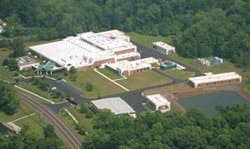Onsite Hypochlorite System Delivers Record Efficiency Levels
| Related Searches from WaterInfoLink.com Forest Park Water Treatment Plant | Onsite Sodium Hypochlorite Generating System | Gannett Fleming | Severn Trent Services |
Montgomery and Bucks counties in the northern suburbs of Philadelphia are among the state’s fastest growing. Bucks County-based Forest Park Water serves the water needs of about 52,000 customers in those counties using surface water drawn from nearby Lake Galena.
In 2005, the utility, which is owned and operated by the North Penn and North Wales water authorities, faced increasing water consumption demands from the growing customer base. Plans were made to double the capacity of its Forest Park Water Treatment Plant in Chalfont.
The new plant would incorporate membrane filtration along with pre-existing processes, including pre-ozone coagulation, sedimentation, post-ozone biological filtration, pH corrosion control and chlorination. For its chlorination needs, Forest Park chose an onsite sodium hypochlorite generating system , which has delivered record, never-before-validated efficiency levels.
System Benefits
“We considered gaseous chlorine, bulk sodium hypochlorite and onsite sodium hypochlorite generation,” said Forest Park Water’s Facilities Director Wayne Letourneau, “and ultimately selected onsite generation. It eliminates concerns about the safety of storing chlorine gas and about regulations related to transportation and storage of bulk chlorine gas. The 12%-15% concentration solution strength of potable grade bulk sodium hypochlorite would have required the development of a risk management plan and Hazmat training. And the generation of chlorate byproduct that results with the storage of bulk sodium hypochlorite was an important consideration, too.
“The 0.8% onsite sodium hypochlorite solution is nonhazardous. The only byproduct is hydrogen gas, which can be safely vented to the atmosphere. The onsite solution is stable, too, and unlike bulk sodium hypochlorite, it doesn’t degrade with exposure to ultraviolet light.”
Forest Park’s engineering firm, Harrisburg-based Gannett Fleming, designed the onsite sodium hypochlorite generation, and the water authorities awarded the general contract, which included two 1,200 lb/day ClorTec generating units , to Severn Trent Services .
Three common consumables are used in the sodium hypochlorite generating process: salt, water and electricity. Softened water is fed into a brine dissolver forming a brine solution, which is further diluted to the desired salt solution. The salt solution is then passed through electrolytic cells, which apply a low-voltage DC current to produce the sodium hypochlorite. The solution is then safely stored in three 12,000-gal day tanks. When it reaches the low-level set point, the system automatically restarts to replenish its supply.
The 0.8% solution generated from the ClorTec system can also be directly used and fed to the membrane elements to act as a disinfectant during routine maintenance and cleaning procedures for the membrane filtration system.
The ClorTec unit’s clear cylindrical cell allows full visibility and easy access to the electrode array. Cells can be removed as a single unit, eliminating the time and labor spent disassembling cell structures and handling electrodes individually.
Achieving Enhanced Operational Efficiency
In order to maximize ratepayer dollars, Forest Park Water and Gannett Fleming used a “guaranteed whole life” approach to the procurement process, allowing each supplier to submit a bid with guaranteed efficiencies backed by a performance bond. Typically, an onsite sodium hypochlorite generating system consumes 2.5 kWh/lb of chlorine and 3.5 lb of salt/lb of chlorine. Severn Trent has advanced onsite hypochlorite generation technology through an enhanced proprietary electrode coating, which significantly reduces the consumption of salt and electricity, providing greater operational efficiency. To meet this guarantee at the Forest Park facility, Severn Trent provided a coating with enhancements that:
- Reduced salt consumption from 3.5 to 2.34 lb of chlorine—a cost reduction of more than 25%;
- Reduced energy consumption from 2.5 kWh to 1.94 kWh/lb of chlorine—a cost reduction of more than 20%.
Beginning operation in November 2006, the new Forest Park Water Treatment Plant has an average flow rate of 15 million gal per day (mgd), with seasonal fluctuations ranging to more than 23 mgd. The onsite hypochlorite generation system has produced more than 400,000 lb of chlorine since it was commissioned.
The enhanced efficiency at the Forest Park installation for more than two years represents the first time such performance has been validated. Such operating cost reductions over the life of the equipment can amount to hundreds of thousands of dollars in some applications. Severn Trent has since validated the performance of many other ClorTec installations using its proprietary enhanced electrode coating, and this technology is now available to all customers using the guaranteed whole life approach.
The ClorTec system surpassed the contract’s performance requirements and impressed Letourneau with its design and overall operation.
“The ClorTec computer program makes our job easier by identifying and pinpointing the source of any operational problems. That minimizes time spent trouble-shooting system problems.
“The lack of ongoing maintenance issues with the system has been a pleasant surprise, too. We were told we’d need to acid wash the system every six months to a year, but after two-and-a-half years, we haven’t had to perform this maintenance yet. The use of high quality salt and soft water feed into the systems has enabled us to go this far without the need to acid wash. And the training and the service made the change from gas to liquid to seamlessly.”
